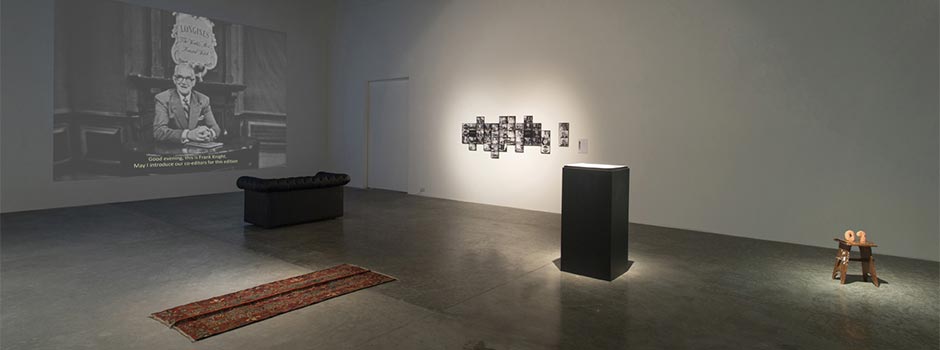
An Exhibition at Green Art Gallery Dubai Statue of Limitation
Dec 08, 2013 Exhibition
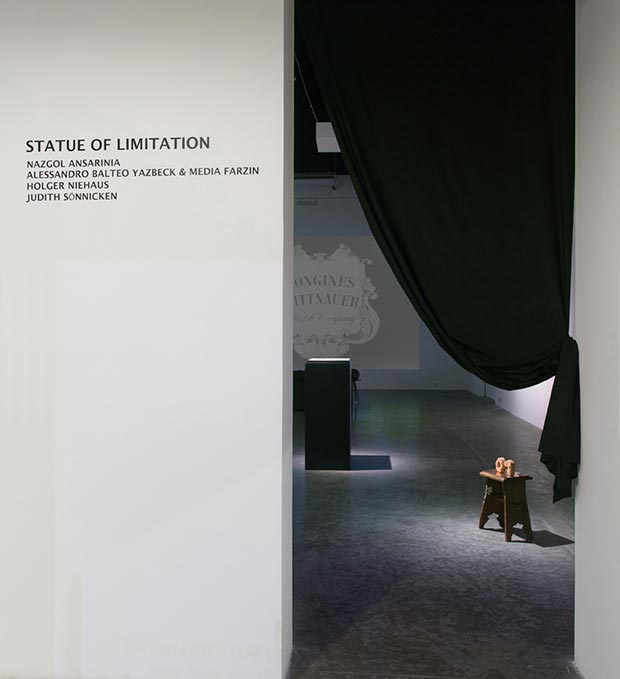 Statue Of Limitation, Installation view / Courtesy of Green Art Gallery
Statue Of Limitation, Installation view / Courtesy of Green Art Gallery
"Let us not be deceived," Bernard Baruch announced in 1947, "we are today in the midst of a cold war." The walls may have come down over two decades ago, but there are numerous symptoms of Cold War antagonisms and unresolved issues in today’s political landscape: global powers attempting to colonize the world intellectually as well as economically, then resorting to concealed or overt violence where the propaganda machine is ineffective.
'Statute of limitations' is a legal term, describing the time frame during which affected parties can take action to seek justice after injury or damage. There is no time limit for seeking justice for large-scale international crimes — financial, technological, or cultural colonization, systemic corruption, invasions, war profiteering, war crimes, state-sponsored terrorism and assassinations, or cyber wars. Yet these are the very crimes that, despite clear evidence of their damage, remain unacknowledged, normalized by social and political systems which condone them. In the face of such systemic violence, this exhibition offers a statue of limitations: an anti-monument to human will, with all its limitations.
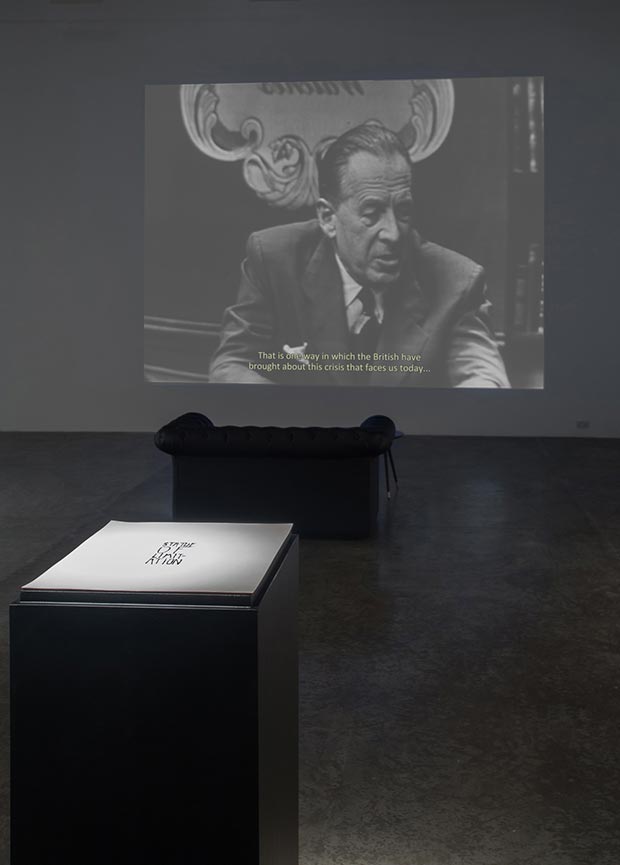 Statue Of Limitation, Installation view / Courtesy of Green Art Gallery
Statue Of Limitation, Installation view / Courtesy of Green Art Gallery
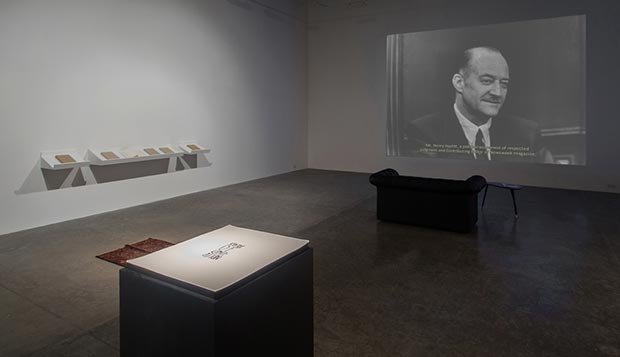 Statue Of Limitation, Installation view / Courtesy of Green Art Gallery
Statue Of Limitation, Installation view / Courtesy of Green Art Gallery
Nazgol Ansarinia’s work rebels against state logic and bureaucracy. Her operations take up official documents (NSS Book Series), as well as quotidian objects (Mendings), which become host to human anxieties and uneasiness about the times we live in.
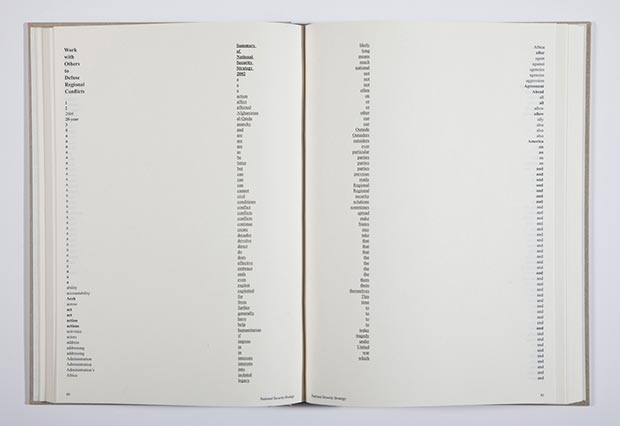 Nazgol Ansarinia / NSS book series, 2008, detail / Courtesy of Green Art Gallery
Nazgol Ansarinia / NSS book series, 2008, detail / Courtesy of Green Art Gallery
_2010.jpg) Nazgol Ansarinia / Mendings (carpet), 2010, mixed media, 203x88.9 cm / Courtesy of Green Art Gallery
Nazgol Ansarinia / Mendings (carpet), 2010, mixed media, 203x88.9 cm / Courtesy of Green Art Gallery
The subjects of Holger Niehaus’s photographs are symbolic abstractions: a vanitas of oil and water, the motivations behind many a political and economical maneuver; a still life version of Kazimir Malevich’s Black Square of 1915 (A48), a radical avant-garde gesture overshadowed by the subsequent trajectory of Soviet socialism but still one of the most influential artworks of the twentieth century.
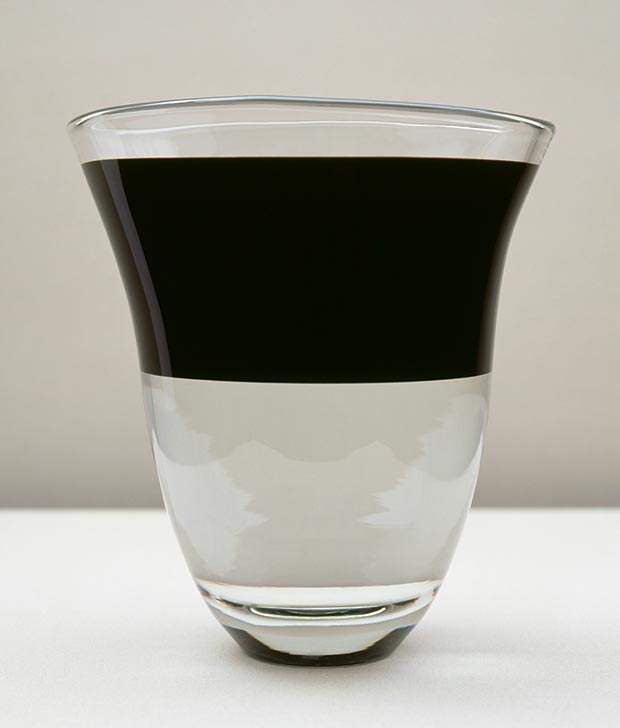 Holger Niehaus / Untitled, 2010, archival pigment print, 105 x 90 cm, ed of 6 / Courtesy of Green Art Gallery
Holger Niehaus / Untitled, 2010, archival pigment print, 105 x 90 cm, ed of 6 / Courtesy of Green Art Gallery
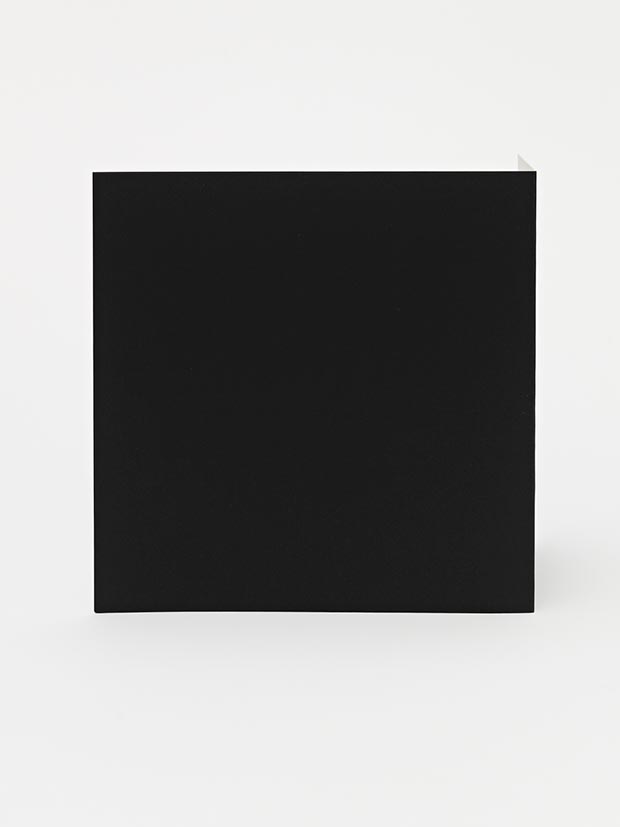 Holger Niehaus / A48, 2012, archival pigment print, 141 x 107 cm, ed of 6 / Courtesy of Green Art Gallery
Holger Niehaus / A48, 2012, archival pigment print, 141 x 107 cm, ed of 6 / Courtesy of Green Art Gallery
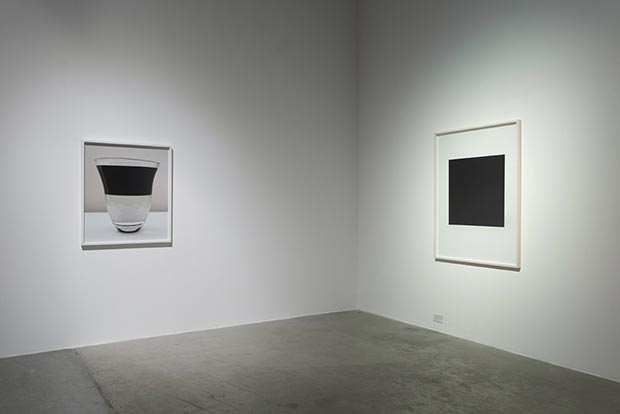 Holger Niehaus / Statue Of Limitation, Installation view / Courtesy of Green Art Gallery
Holger Niehaus / Statue Of Limitation, Installation view / Courtesy of Green Art Gallery
Judith Sönnicken’s anti-monuments suggest the recurrence of uneasy events. One is an image of a paradox (Statue of Limitation): a human-size empty pedestal — a claim to represent the act of limiting? The other gives physicality to the digital (Back Up), speaking to the anxiety of losing the digital tools that enable so many facets of our everyday life, and perhaps presaging a lost age ended by advanced digital, or nuclear, weapons.
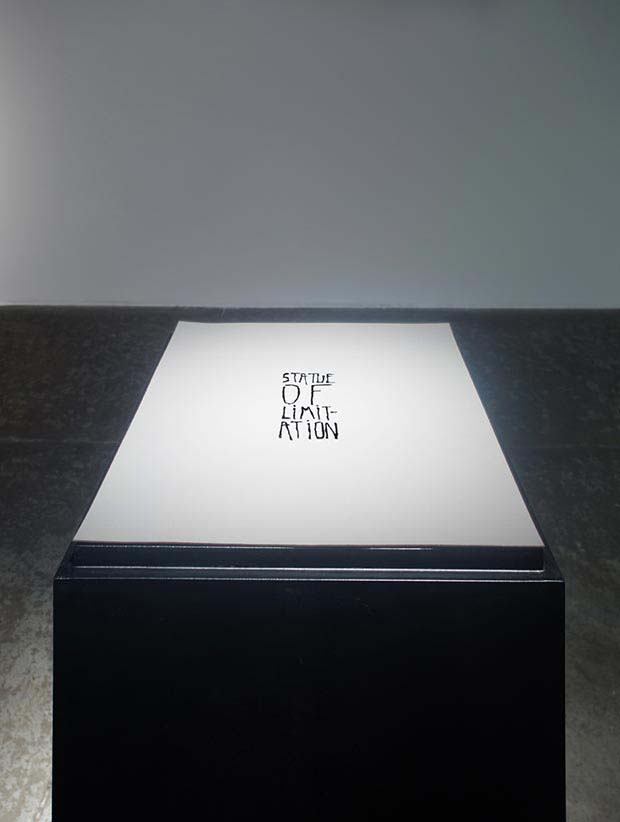 Judith Sönnicken / Statue Of Limitation, 2013, (detail) Marker on paper, pedestal, 121 x 50 x 60 cm, unique / Courtesy of Green Art Gallery
Judith Sönnicken / Statue Of Limitation, 2013, (detail) Marker on paper, pedestal, 121 x 50 x 60 cm, unique / Courtesy of Green Art Gallery
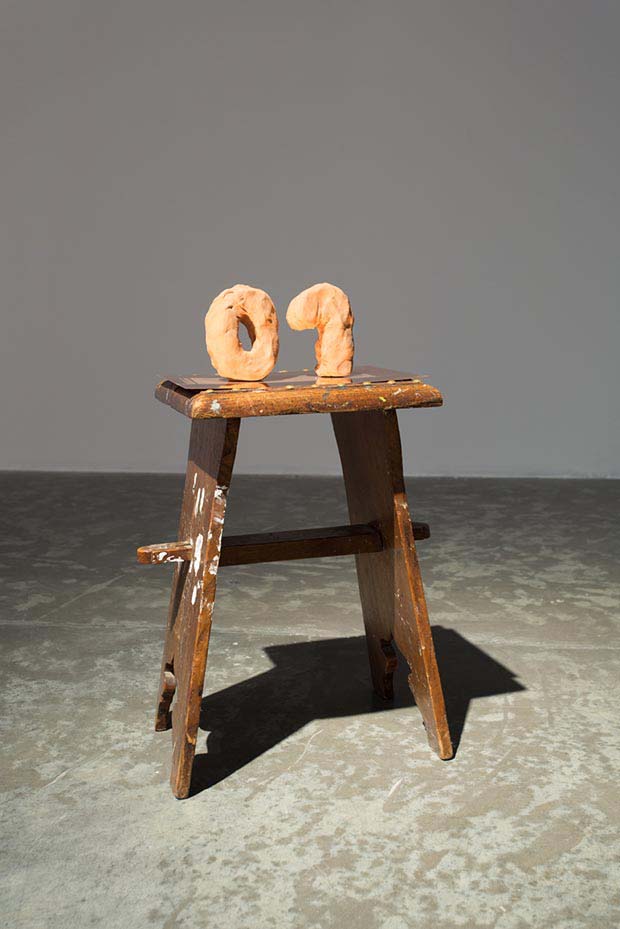 Judith Sönnicken / Backup, 2013, Clay, copper, wood, metal, 57 x 28 x 37 cm, one of 3 versions / Courtesy of Green Art Gallery
Judith Sönnicken / Backup, 2013, Clay, copper, wood, metal, 57 x 28 x 37 cm, one of 3 versions / Courtesy of Green Art Gallery
Alessandro Balteo Yazbeck and Media Farzin take a 1950s-era US television program about current politics as the source material of their video (Chronoscope, 1951, 11 pm). By selectively reordering its conversations, the statements of various interviewees are weaved into a single dialogue. The result is a disquieting snapshot of early Cold War discourse and its resonances in the present day.
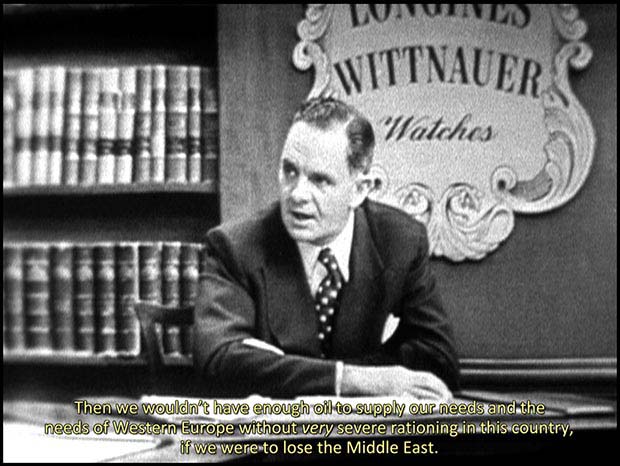 Alessandro Balteo Yazbeck / Chronoscope, 1951, 11pm, 2009-2011. In collaboration with Media Farzin / Courtesy of Green Art Gallery
Alessandro Balteo Yazbeck / Chronoscope, 1951, 11pm, 2009-2011. In collaboration with Media Farzin / Courtesy of Green Art Gallery
Born in 1979 in Tehran, Nazgol Ansarinia graduated from the London College of Communication in 2001 before taking a Master of Fine Arts at the California College of the Arts (CCA) in San Francisco in 2003. Select exhibitions include: Longing Persia, Exchange and reception of art in Persia and Europe in the 17th Century & Contemporary Art from Tehran, Museum Rietberg, Zurich (2013); Safar/Voyage at The Museum of Anthropology at the University of British Columbia, Vancouver (2013); When Attitudes Became Form Become Attitudes at the CCA Wattis Institute for Contemporary Arts and the Museum of Contemporary Art Detroit (2012, 2013); A Permanent Record For Future Investigation, Green Art Gallery, Dubai (2012) and Interior Renovations, Tehran, 2010, Green Cardamom, London (2011). Nazgol Ansarinia took part in the 10th & 12th Istanbul Biennial and was a recipient of the 2009 Abraaj Capital Art Prize. She lives and works in Tehran, Iran.
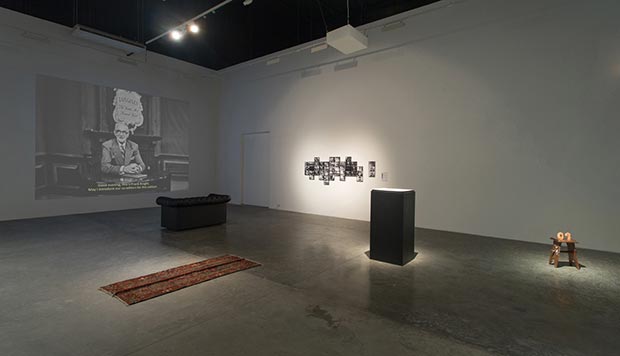 Statue Of Limitation, Installation view / Courtesy of Green Art Gallery
Statue Of Limitation, Installation view / Courtesy of Green Art Gallery
Holger Niehaus was born in 1975 in Nordhorn, Germany and studied at the AKI – Academie voor beeldende Kunst en Vormgeving in Enschede, The Netherlands. His work has been shown in multiple solo and group exhibits in Amsterdam, Utrecht, Santiago de Compostela, Hamburg and Berlin amongst others, He had his first museum show in the Gemeentemuseum, The Hague, The Netherland in 2010.
Born in 1981 in Germany, Judith Sönnicken graduated with a Master of Fine Arts at the University of the Arts in Berlin in 2010. Since 2005 she has exhibited internationally in solo and group exhibitions including the Autocenter Berlin, Art Center Los Angeles, Bourouina Gallery Berlin, Lisi Hämmerle Gallery Bregenz, Museo Geológico de Portugal, Neuer Pfaffenhofener Kunstverein, Spinnerei Leipzig and Klondike Institute of Art and Culture in Dawson City, Canada. She lives and works in Berlin, Germany.
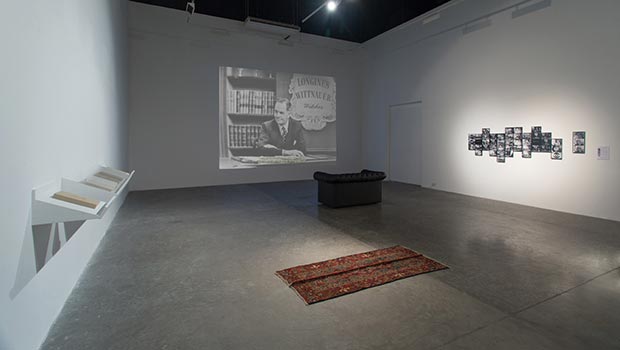 Statue Of Limitation, Installation view / Courtesy of Green Art Gallery
Statue Of Limitation, Installation view / Courtesy of Green Art Gallery
Alessandro Balteo Yazbeck was born in Caracas, Venezuela in 1972. Recent solo exhibitions include 'Cultural Diplomacy: An Art We Neglect' at Galerie Martin Janda, Vienna, Austria; 'Modern Entanglements', Henrique Faria Fine Art, New York, NY, 'Corrupted Files' at Galeria Luisa Strina, Sao Paulo, Brazil; and 'A little bit of heaven' at Carpenter Center for the Visual Arts, Harvard University, Cambridge. He has been included in numerous group exhibitions including most recently: 'Liquid Assets, in the Aftermath of the Transformation of Capital', Steirischer Herbst (2013), Graz, Austria, 'Order, Chaos, and the Space between: Contemporary Latin American Art from the Diane and Bruce Halle Collection', Phoenix Art Museum, Phoenix, (2013); 'When Attitudes Became Form Become Attitudes', CCA Wattis Institute, San Francisco (2012); 'Artist on the News', Creative Time, New York (2012); 'Liberalis', Lütze-Museum and Galerie der Stadt Sindelfingen (2011); 12th International Istanbul Biennial, Istanbul (2011); 'Then & Now: Abstraction in Latin American art, 1950 to Present', Deutsche Bank, New York (2010); 'Panorama', Museu de Arte Moderna de Sao Paulo (2009). He lives and works in Berlin.
Media Farzin (born 1979, San Diego) is a New York-based critic and PhD candidate in art history at the City University of New York, researching language-based U.S. art of the 1970s. She received her BFA in Painting from Tehran University and MA in Curatorial Studies from Columbia University. She is the author of numerous monographic essays on artists, contributor to various art journals, and currently a lecturer at the City College of New York. Her ongoing collaborative project with Alessandro Balteo Yazbeck was most recently exhibited at the Steirischer Herbst in Graz, Austria.
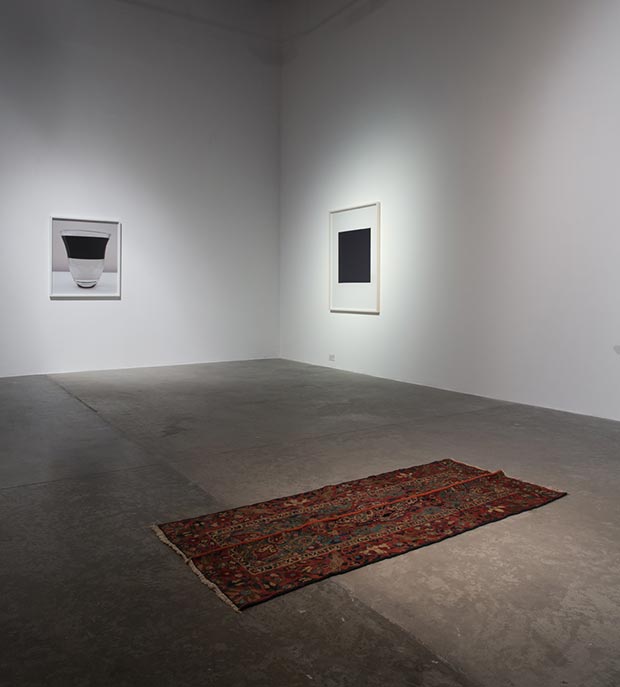 Statue Of Limitation, Installation view / Courtesy of Green Art Gallery
Statue Of Limitation, Installation view / Courtesy of Green Art Gallery
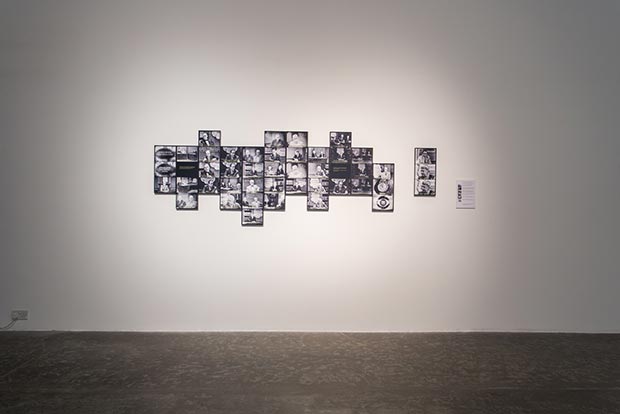 Statue Of Limitation, Installation view: Alessandro Balteo Yazbeck, Chronoscope, 1951, 11pm [Stelae], 2009-2011. In collaboration with Media Farzin. / Set of 12 C-prints, Diasec mounting with aluminum frames and wall label with legend. Installation dimensions 91 x 320 cm. Ed. 5 + 2AP / Courtesy of Green Art Gallery
Statue Of Limitation, Installation view: Alessandro Balteo Yazbeck, Chronoscope, 1951, 11pm [Stelae], 2009-2011. In collaboration with Media Farzin. / Set of 12 C-prints, Diasec mounting with aluminum frames and wall label with legend. Installation dimensions 91 x 320 cm. Ed. 5 + 2AP / Courtesy of Green Art Gallery
The exhibition will run until January 4, 2014.
Comments
Add a comment